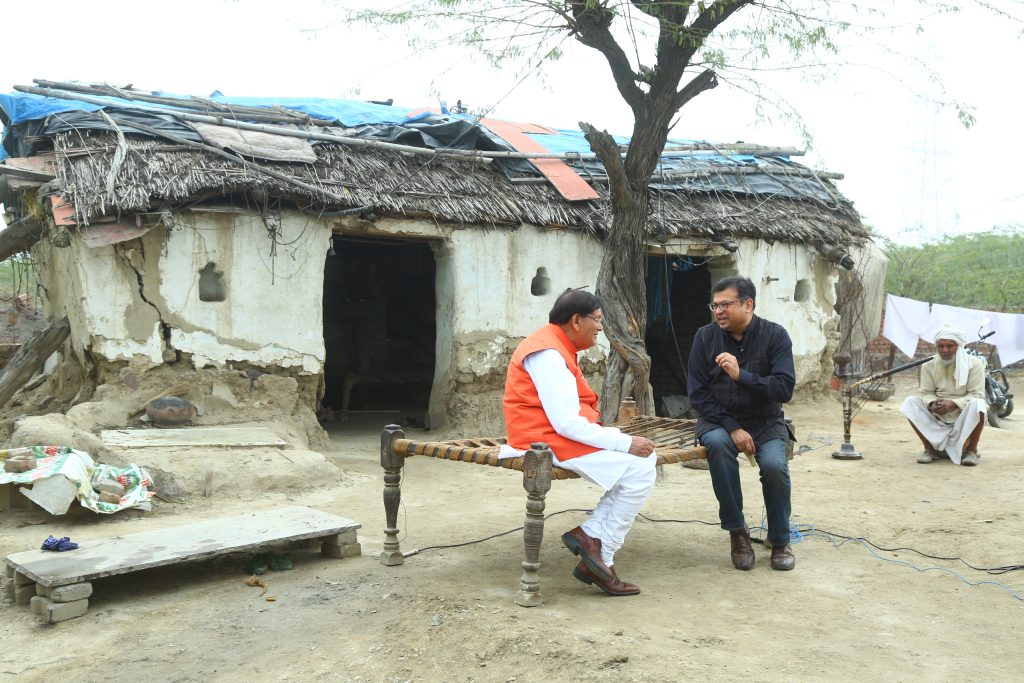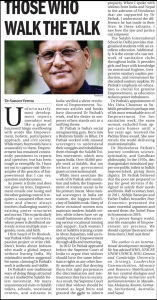
The author, with Dr Bindeshwar Pathak (left), discusses Empowerment in rural Haryana, India.
Unfortunately, most development reports nowadays read like a game of buzzword bingo overflowing with words like Empowerment, holistic, participatory approach, and civil society. While many buzzwords have a seasonality to them, Empowerment has remained consistently prominent in reports and speeches; but has been tough to exemplify. So, I have set out to capture real-life examples of the practice of Empowerment that I can see, question and document.
As power is finite and does not grow on trees, Empowerment entails one losing and the other gaining control. It requires a sustained effort over time and almost always involves challenging society’s existing power structures and norms. This is particularly challenging in societies where power is distributed unevenly across multiple axes -gender, caste, and faith.
I first heard of Dr Bindeshwar Pathak while working on a passion project to write children’s books about Indians who made a global impact without leaving India. My minimalist mother suggested his name, claiming Dr Pathak’s work is authentic and visible.
Dr Pathak’s non-traditional ways of doing things attracted me as I studied the Sulabh Toilets movement. My many unannounced visits to Sulabh toilets, schools, vocational centres, and ashrams in India verified a silent revolution of Empowerment. Numerous articles and books have discussed Dr. Pathak’s work, and his desire to empower others stands out as a unifying theme.
Dr Bindeshwar Pathak is India’s social reengineering guru. Born into a Brahmin family in Bihar, Dr Pathak worked with manual scavengers to understand their struggles and rehabilitate them through the Sulabh Toilets movement, which now spans India. Over fifty thousand people work at Sulabh, that too without any government grants or international aid.
While most associate the work of Dr Pathak with sanitation and toilets, the Empowerment of women seems to be his primary intent. Most manual scavengers in India are women, the biggest beneficiary of Sulabh’s work. Many of these retrained women now maintain modern Sulabh toilets, while others have set up small businesses after receiving various vocational training and support. Each woman I met at Sulabh’s training centre in Alwar, Rajasthan, told an inspiring story of Empowerment through skills and mentoring.
In 2012 Dr Bindeshwar Pathak appeared before the Supreme Court of India to argue that widows should have the same inheritance rights as any other family member and that denying them this right perpetuates the discrimination and mistreatment they face in society. As a result, the Supreme Court ruled that widows should be treated as legal heirs and granted the right to inherit property. When I spoke with widows from India and Nepal in the ashrams of Vrindavan that are supported by Dr Pathak, I understood the difference he has made in their lives. In these ashrams, I saw how the law and justice can empower.
The Sulabh International School in Delhi provides marginalised students with an excellent education. Additionally, it is the centre of a vast network of sanitation clubs throughout India. It provides girls and boys with knowledge on menstrual hygiene, inexpensive sanitary napkin production, and incinerators for discarded sanitary napkins. Dr. Pathak’s emphasis on education is crucial for genuine Empowerment, as education reduces power imbalances.
Dr Pathak’s appointment of Mrs Usha Chaumar as Sulabh’s president is perhaps one of his most remarkable acts of Empowerment. For her sanitation work, the same woman, excluded from upper-caste homes until a few years ago, received the Padma Shree award. She now travels the world delivering motivational talks.
I admire Dr Bindeshwar Pathak’s journey, which combines science, spirituality, and Gandhian philosophy. In the 1970s, this changemaker introduced pay-per-use public toilets to India’s impoverished, giving them dignity. Dr Pathak believed that the poor are prepared to pay for good services if designed to satisfy their needs and limits. Half a century later, in 2011, Abhijit Banerjee and Esther Duflo’s bestseller “Poor Economics” presented the same essential argument and earned them the Nobel Prize in Economics in 2019.
In a power-hungry world, real-life examples of Empowerment are precious. We should capture them and celebrate them. Until next time!
Dr Sunoor Verma is an international development strategist. He has advised WHO, UNICEF, UNDP, UNHCR, HUG-Geneva and Cambridge University on Strategy, Leadership Communication, Advocacy and Resource Mobilization. He has curated dialogue and partnership initiatives with parliamentarians in Macedonia, Malaysia, Kosovo, Germany, Switzerland, Australia, and Nepal. More on his work is on www.sunoor.net
Published in The Himalayan Times on 2nd May 2023
